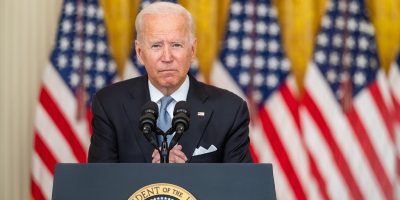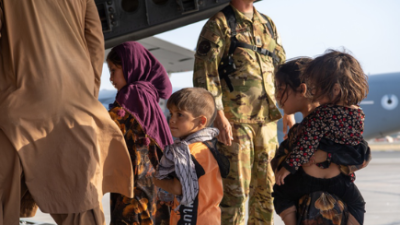Refugees and Asylum Seekers
The United States has a longstanding tradition of welcoming individuals from around the world who are seeking protection and refuge. But recent U.S. policy has grown increasingly hostile toward asylum seekers and refugees. Instead of turning vulnerable individuals away, the United States should maintain its global reputation as a leader in refugee resettlement and humanitarian protection. Doing so not only upholds American values but sustains and strengthens our communities. Data from the Council shows that refugees and asylees make tremendous contributions to our economy as earners, taxpayers, and consumers. Learn more about the contributions and challenges of asylum seekers and refugees below.

The End of Title 42: A Long-Overdue Step Toward Rebuilding our Asylum System
The Biden administration announced today plans to end a border expulsions policy known as Title 42 by May 23. This policy allowed the U.S. government to turn people away at the U.S southern border over 1.7 million times in the past two years under the guise of protecting the country from COVID-19. Read More

Biden’s New Asylum Process: What You Need to Know
The Biden administration finalized its long-anticipated plan for overhauling the asylum system on March 24. The regulation, which is set to go into effect on an interim basis in 60 days, was first put forward for public comment in August 2021. Asylum seekers arriving at the border and… Read More

Asylum Changes from the Biden Administration Will Not Ensure Due Process as Required by U.S. Asylum Law
The American Immigration Council and the American Immigration Lawyers Association (AILA) responded to today’s release of an interim final rule related to asylum procedures with concern. The rule is being published in draft form and is slated to take effect in 60 days, however additional public comment is being accepted for 60 days. Read More

Iraqi Refugee Helps Other Newcomers Settle in Lincoln
Maysoon ShaheenDoctoral Student and Ambassador for Local Arabic Community Maysoon Shaheen fled Iraq in 1998 during Saddam Hussein’s regime, a move that likely saved her life. In order to receive her bachelor’s in education, Shaheen was required to sign a form saying she supported Saddam. She refused and escaped… Read More

Mexican Artist Finds Community in Lincoln
David ManzanaresMural and Sculpture Artist In 2017, David Manzanares moved to Lincoln with his Nebraskan-born wife and two sons, then ages 3 and 1. Manzanares is a mural and sculpture artist whose work often revolves around his Oaxacan heritage. He hoped America would help expand his audience and provide… Read More

Laotian Refugee Gives Back to Lincoln Community
Soulinnee PhanCity of Lincoln City Clerk Soulinnee Phan’s parents came to Nebraska from Laos, fleeing the Communists. A few years prior, they’d swum for their lives across the Mekong River and met at a Thai refugee camp. By the time Phan’s mother boarded a military plane to America in… Read More

Why Are Afghans Facing Significant Delays in Humanitarian Parole and Refugee Processing?
The withdrawal of U.S. troops from Afghanistan in August 2021—as the country’s government was overtaken by the Taliban—led to the chaotic evacuation of thousands of Afghan nationals. The tragic images from Kabul airport last summer of desperate Afghans trying to escape their embattled nation evidenced the dire need to assist… Read More

Alternatives to Immigration Detention: An Overview
This fact sheet provides an overview of the wide range of programs that provide alternatives to detention (ATDs) and run the gamut from no governmental intervention to extensive surveillance and restrictions on liberties, Read More

Investigating USCIS’ Implementation of Humanitarian Parole and Refugee Processing for Afghan Nationals
This Freedom of Information Act (FOIA) request seeks to uncover information about how the humanitarian parole process and refugee program is working with respect to Afghan nationals. Read More

Juan Arias
In the late 1990s, at age 21, Juan Arias fled economic crisis in his native Ecuador. He landed in Richmond, Indiana, a small town with few Hispanic people. “When people saw me, they’d stare at me like I had a third eye,” he recalls. “It was isolating. I went from… Read More
Make a contribution
Make a direct impact on the lives of immigrants.
